CLAS 353
October 10, 2024

Picasso, Guernica (1937)
CREATIVE PROJECTS (due 10/15 in D2L)
GROUP PRESENTATIONS (Groups 1-3 on 10/17; Groups 4-6 on 10/22)
GROUPS
Thebaid 9: aristeia & death of 2 of Seven Against Thebes, Hippomedon (killed by River Ismenos; cf. Amphiaraus's prophecy, "One expires, tumbled about by a rainstorm", 3.544) & Parthenopaeus (pathos: "dying, he wept for / his downed horse", 9.877-8; cf. poet's final reflection on funerals, "equally mourned by men on both sides", 12.807); 4 of 7 Argive generals dead
Thebaid 10: Thebans overcome by Sleep at end of day 2; night(marish) raid on moonlit Theban camp
- Dymas & Hopleus (young squires of Parthenopaeus & Tydeus) refuse to retreat: deaths (Dymas, "This, at least for the meantime, you may use for your tomb", 10.440)?
Thebaid 10.445-8 (eulogy of Dymas & Hopleus; literary competition with Vergil)
(Though my song soars from a lowlier lyre, the two of you,
like others, will—immortalized—cheat memorial Time. [memores superabitis annos, lit., "you'll conquer the years that have memory"]
And perhaps, Euryalus shall not spurn your shades as his
comrades and you shall bask in Phrygian Nisus' glory!)
- battle continues @dawn of 3rd day; resentment toward Eteocles in Thebes after nighttime massacre (“Restore the brother! . . . restore the throne!", 10.580ff.)

Rubens, The Death (devotio) of Decius Mus in Battle (1618)
- Tiresias calls for human sacrifice (young scion of royal family): Creon’s (Jocasta's brother) son Menoeceus's heroic suicide inspired by Valor (Virtus) with invocation of Muses (10.628-31); cf. Roman devotio (sacrifice of general to underworld gods)
Thebaid 10.773-82 (Menoeceus's devotio from Theban walls)
[He] sought with his glittering blade the notable soul
that scorned his flesh and grieved to have been so long detained:
he found and broke its thread with a single thrust. Sprinkling
the towers with his blood and asperging the walls, he threw himself
out over the battle lines and, since he had not yet drawn
his sword out, he tried to crush savage Achaeans. But
Devotion [Pietas] and Valor [Virtus] bore his body gently to earth,
cradling it in their arms; his soul had long since entered
the presence of Jove and called for its crown amid stars on high. [cf. Stoicism]
- outcome of devotio for Thebes?
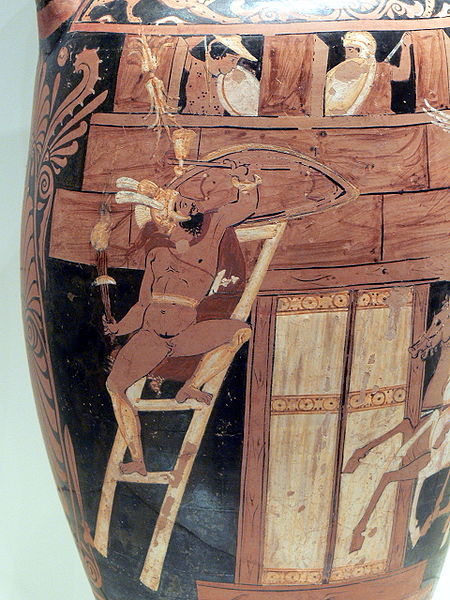
Capaneus on walls of Thebes (red-figure amphora, ca. 350 BCE)
- Capaneus: aristeia, final challenge to gods,"I'll test the worth of sacrifice, see if Apollo lies" [re Menoeceus] (10.847) & spectacular death ("first, his helmet-crest flew into the clouds, / and the blackened boss dropped from his shield; then the hero's limbs / all lit up", 10.928-30; cf. prophecy, "One eagle, soaring, catches fire in a blaze of sun", 3.539) & wife Evadne "on her dear one's fires" (12.801)
- Polynices & Adrastus remain (end of Thebaid 10)
Thebaid 11: Furies drive brothers to duel; failed pleas of Jocasta’s to Eteocles & Antigone’s to Polynices, Eteocles shoots out of Theban Gates (3.388); the duel's aftermath
Thebaid 11.396-402 (Polynices's envy highlighted before duel)
[Polynices] glared at his brother—for, deep in his heart, jealousy burned
at the other’s vast retinue, regal casque, at his steed
draped in crimson trappings, his buckler flashing with yellow
gold—although he himself was not meanly accoutred,
but wore an unusually lustrous cloak (one that Argia
had worked in Maeonian fashion: her skillful
fingers had allied golden warp to purple web).
- Adrastus offers Polynices his kingdom & flees (11.439ff.) – nuda potestas!
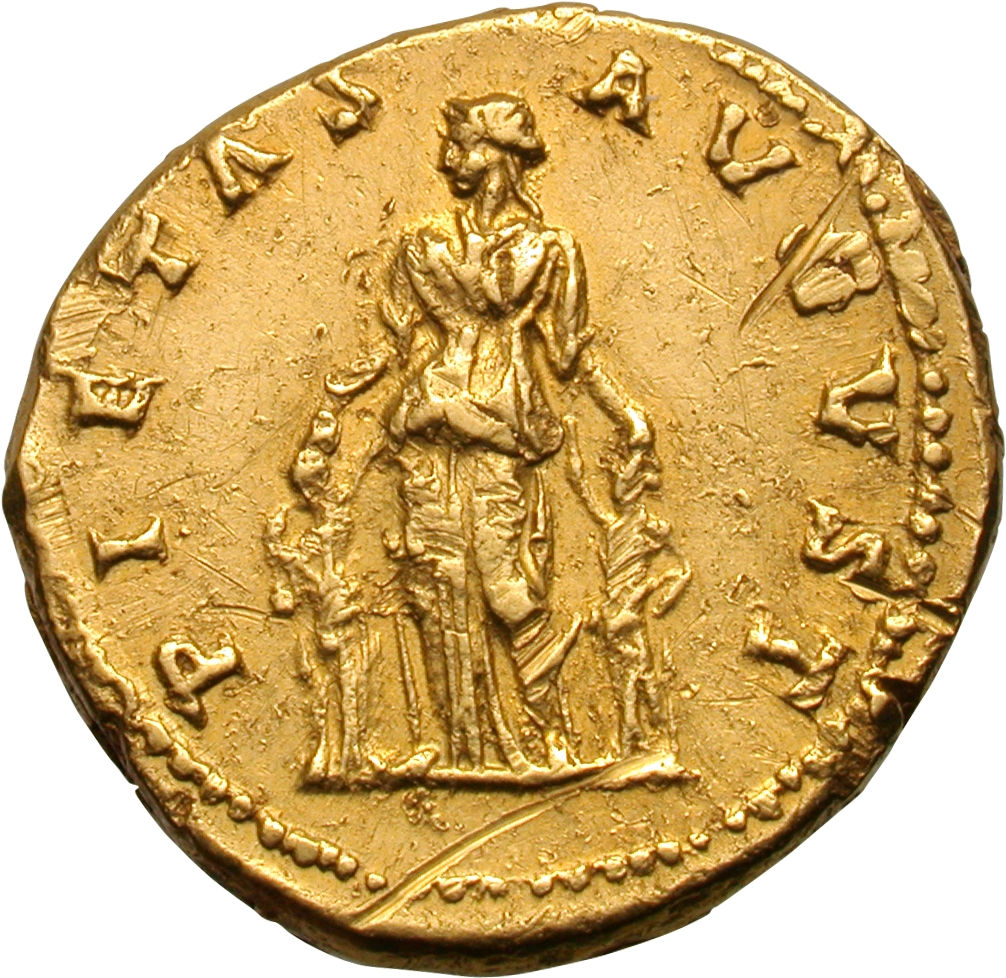
Pietas on coin of Trajan (98-117 CE)
- epiphany of Pietas ("Devotion") on battlefield, appeal to family and mercy: "the ranks saw that what they did was wrong / Cheeks and chests flowed / tears, a wordless revulsion stole over the two brothers", 11.475-6; Pietas flees (Tisiphone!) & duel begins; horses violently collapse (two ships simile, "they sink intertwined to the ocean floor", 11.523)
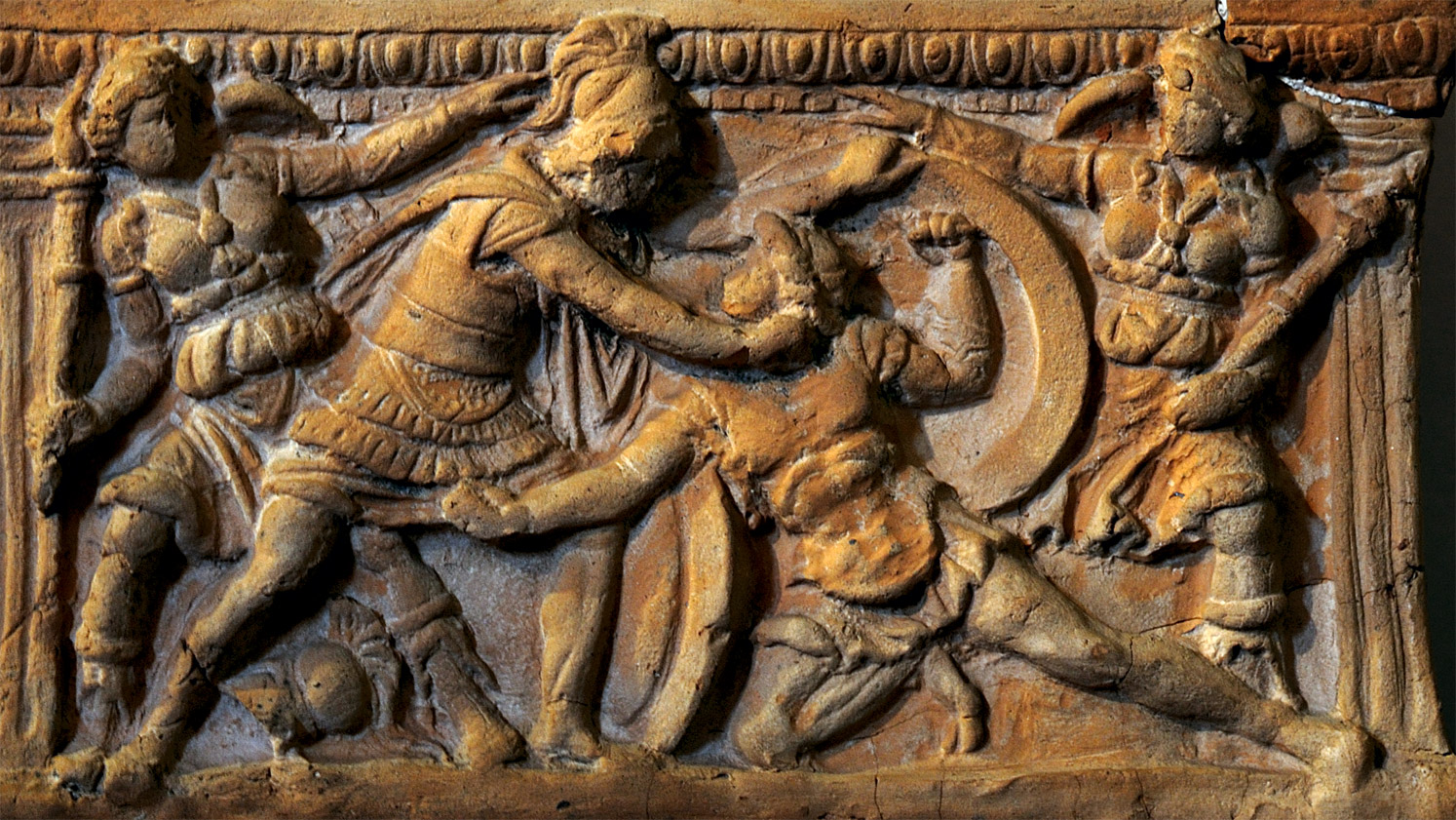
Etruscan funerary urn depicting a duel (2nd century BCE)
Thebaid 11.530-5 (simile describing dueling brothers)
Hot as blue blazes, like two wild boars, whose headlong rage
has made them square off and their back bristles stand on end:
pig eyes flash fire, pig snouts with crescent-shaped, upcurved
tusks squeal, while a hunter, watching the fight from a rocky ledge
nearby, goes pale and orders his dogs to hush. Greedy
as that, the two men attack.
epic duels in film:
Finale of Sergio Leone's Once Upon a Time in the West (1968): https://www.youtube.com/watch?v=BdK0jaLuJL8
Final scene of The Good, the Bad and the Ugly (Sergio Leone, 1966): https://www.youtube.com/watch?v=aJCSNIl2Pls
Ben Kenobi vs
Darth Vader, Star Wars: Episode IV-A New Hope (1977): https://www.youtube.com/watch?v=sq51w34Hg9I
Showdown at the House of Blue Leaves, Kill BIll: Vol. 1 (2003): https://www.youtube.com/watch?v=EajaioMj-NA
Subway fight in The Matrix (1999): https://www.youtube.com/watch?v=7GSgWzmR_-c
- mutual slaughter as Polynices seeks scepter & crown; narrator’s outburst at horror, “. . . let one day alone have seen / this breed of foul deed, let this monstrous infamy fall / from memory—only kings should recall such a duel” (11.577-9) – Roman relevance?

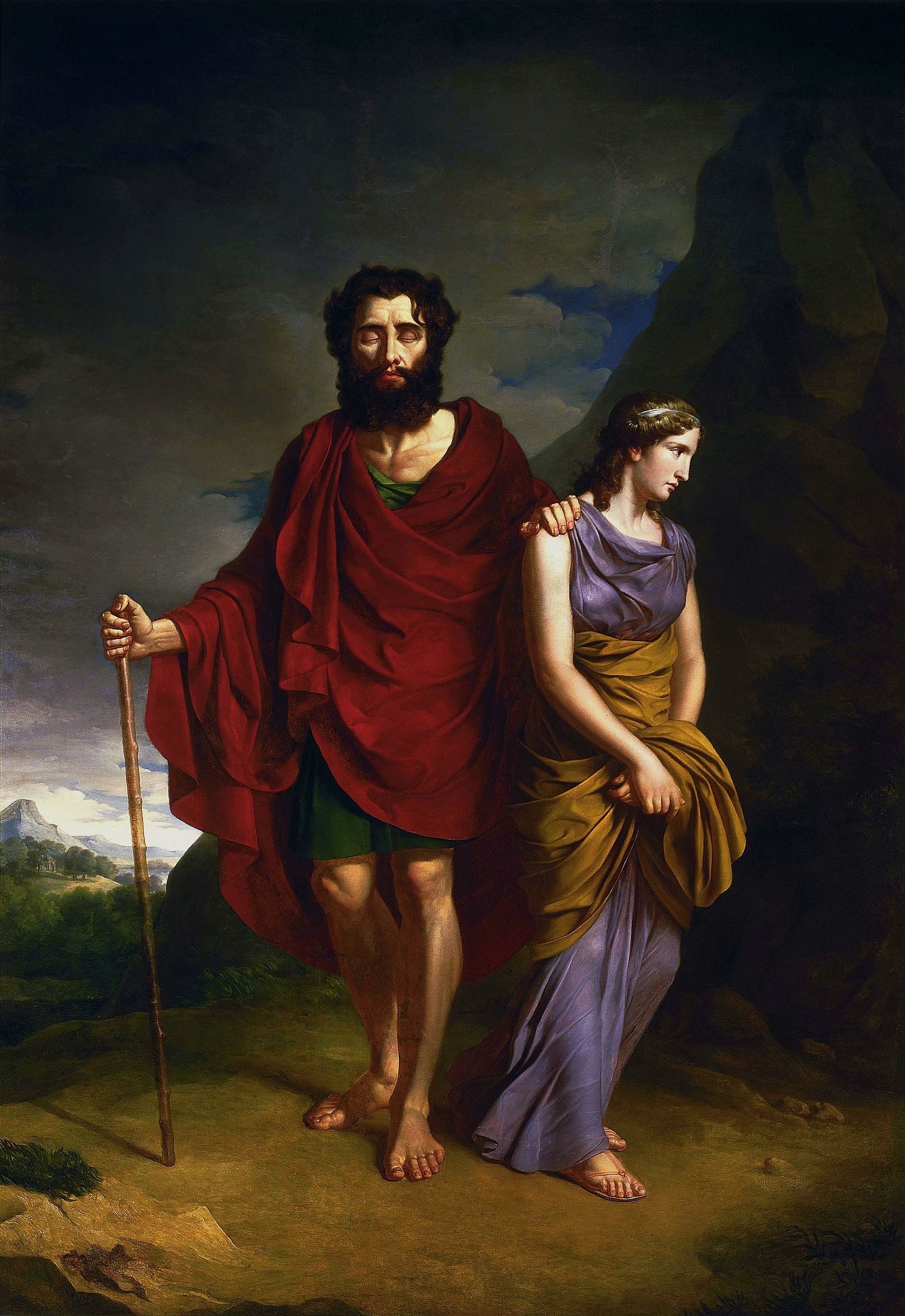
L: Per Wickenberg, Oedipus & Antigone (1833); R: Brodowski, Oedipus & Antigone (1828)
- grotesque family reunion: Antigone & Oedipus appear ("so late, Devotion [Pietas]? after a long time, do You now / shake my mind? Is there clemency deep in this old man's heart?", 11.605-6); Oedipus "gropes for a blade" over sons' tangled bodies; Jocasta’s suicide reported
- Creon assumes kingship ("succession"), forbids cremation of Argives, banishes Oedipus; night falls at end of Thebaid 11
Thebaid 12: focus on Argia & Antigone; Athenian intervention at Thebes; funerals
- Argia’s heroic journey to Thebes as Argive women appeal to Athens: “in an upsurge / of unfeminine valor [virtus], Argia nerved herself / and ignoring her gender, contrived an immense task” (12.176-8)
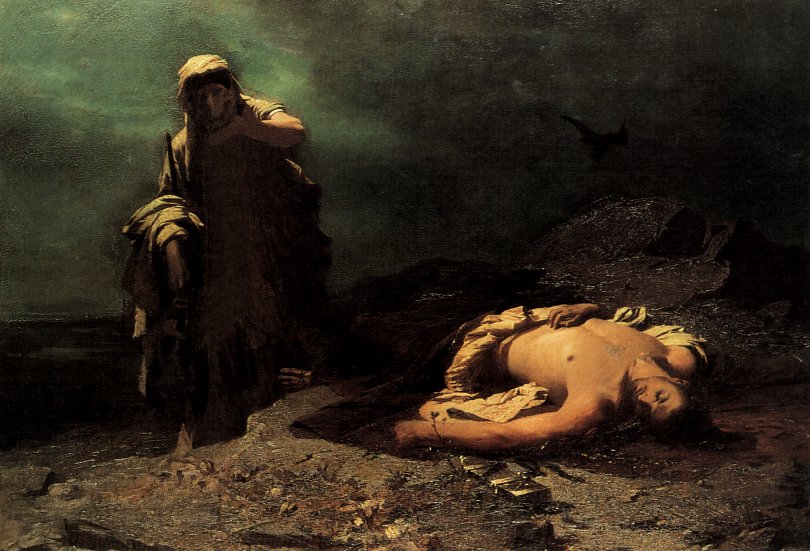
Lytras, Antigone in Front of the Dead Polynices (1865)
- Argia meets Antigone; solidarity of sister & wife in shared grief for Polynices
Thebaid 12.416-36 (Argia & Antigone care for the body of Polynices; the hideous cremation)
When, cleansed by the stream, his limbs had regained glory
of death, then, after last kisses, the wretched women scoured
the burning-pits round them for embers, but all the ashes
were cold and lifeless, every bone-fire had died down.
Was it chance? or divine will? A pyre was still standing—the one
raised to roast Eteocles' savage carcess: either
Fortune was setting the scene once more for monstrosities, or
a Fury had kept these flames safe to further the conflict.
Here it was, among blackened logs, that the frantic pair
observed a feeble spark; at the sight, together they wept
tears of joy. Whose bone-fire they'd found was not yet clear.
They prayed that, whoever it was, gracious and gentle, he might
take in a guest and let their two souls and ashes combine.
Behold! brothers once more! As devouring fire first
licked his limbs, the timbers shook, pushing the newcomer off
the pyre. Flames billowed forth and, as a tip split in two,
each crown in turn glittered, each had its light torn away.
As though pallid Orcus had set two Eumenides’ brands
to brawling, each fireball threatened, each strove to outclimb
the other; the whole structure shifted its weight and moved
apart a little.
- Antigone & Argia arrested by Creon's guard, competitive bickering
Thebaid 12.456-63 (two women's degraded heroism)
Courting savage destruction, they burned with a heartfelt desire
for death: one boasted she’s stolen her brother’s, one her husband’s
remains, vying in turns: “My proof is the corpse.” “Mine the flames.”
“I was led by devotion!” “And I by love.” They insisted
on harsh treatment and happily thrust their wrists into the cuffs.
Gone the respect that had colored their speech just now, replaced—you’d
swear!—by hatred and rage, so shrilly did these two women
wrangle, dragging their captors the while before the king.
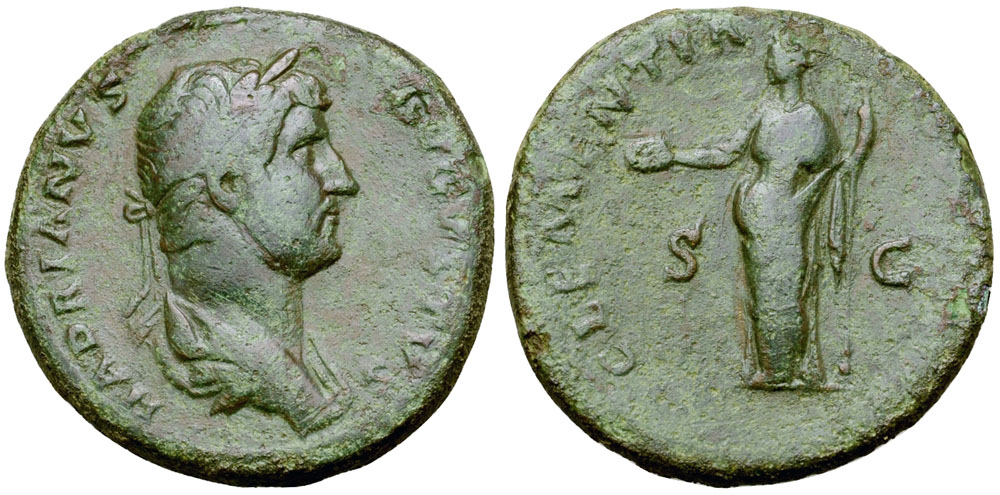
Clementia (R) performing a sacrifice on coin of Hadrian (L) (132-134 CE)
- Argive mourners appeal to Athens (12.464ff.): Altar of Mercy/Clementia), Romanized Theseus returning in triumph over Amazons
- Theseus kills Creon, welcomed in Thebes; treaty & funerals; final image of Argive women grieving (cf. Iliad)
- secure peace? [post-Thebaid Epigoni (Sons of Seven) restore son of Polynices to throne of Thebes (succession)]
- Statius & Roman imperial themes (1st century CE family dynasties, civil war) > Theban curse a Theban or human condition (jealously, revenge, desire for power & domination, etc.)? "raw power . . . Monstrous madness purchased the chance / to sit on the throne—of Oedipus!" (1.140ff.)
Thebaid 12.798ff. (the poet's exhaustion at horror!)
Not if some God let my heart speak in a hundred voices
could I wish with my efforts to do justice to all those funerals . . .
- Epilogue: bold epic-poetic confrontation with Vergil
Thebaid 12.810-19
WILL YOU LONG endure? Outliving your master, will you be read,
O my Song of Thebes, that I labored at late at night, for
twice six years? Surely present already, Fame has eased
your way and begun to show you, new-made, to the future;
already, magnanimous Caesar deigns to acknowledge you;
Italy’s eager schoolboys already recite you from memory.
Live on, I pray! Do not try to surpass the Aeneid divine,
but at a distance, follow and always revere Her imprint. [cf. Aeneid 2.711]
Soon, if some bruised Envy still spreads clouds before you, it will
set; after I’m gone, you’ll win your well-deserved honors.









